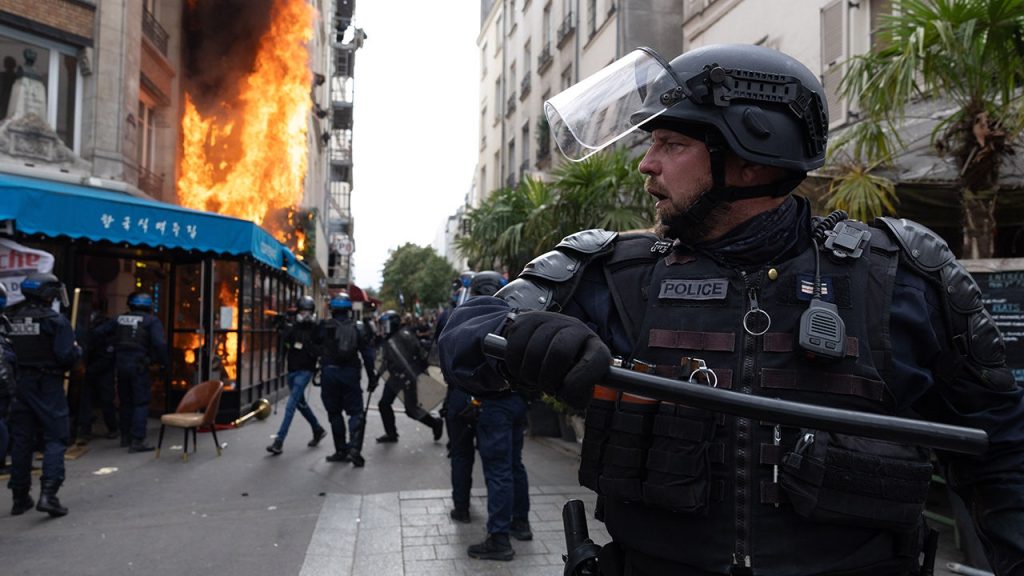French Protests Sweep the Nation as New Prime Minister Takes Office
In a striking display of public discontent, France witnessed widespread protests on Wednesday as the “Block Everything” movement took to the streets across the country. Hundreds of demonstrators were arrested while engaging in various acts of civil disobedience, from blocking major roadways to lighting fires in urban centers. According to the interior ministry, 295 people were detained in just the first few hours of what had been planned as a nationwide day of protest. The demonstrations come at a particularly turbulent time for French politics, with Prime Minister François Bayrou having lost a parliamentary confidence vote on Monday, forcing his resignation after a brief tenure. President Emmanuel Macron swiftly appointed Sébastien Lecornu as his replacement, marking France’s fourth prime minister in just one year—a revolving door that has contributed to growing public frustration with the government’s stability and direction.
“They’re trying to make working people, young students, retirees, all people in difficulty, bear all the effort instead of taxing wealth,” said Baptiste Sagot, a 21-year-old student, expressing a sentiment shared by many protesters. This frustration stems largely from Bayrou’s proposed austerity measures, which would have cut public spending by approximately $51 billion to address France’s ballooning deficit. With the country’s public debt reportedly reaching 114% of its GDP by the first quarter of 2025, the government faces enormous fiscal challenges. However, many citizens believe these economic burdens are being unfairly distributed, falling primarily on those already struggling financially while wealthy individuals and corporations are perceived to escape meaningful contribution to the national financial recovery.
The protests in Paris were particularly intense, with demonstrators repeatedly attempting to block the capital’s beltway during morning rush hour, prompting police to respond with tear gas. Throughout the city, protesters piled up trash cans and hurled objects at police officers, while firefighters rushed to the downtown Châtelet neighborhood where a fire had broken out in a restaurant and threatened nearby buildings. By mid-afternoon, Parisian police had made 183 arrests, with more than 100 additional people taken into custody elsewhere across France. The intensity of the demonstrations prompted the government to deploy around 80,000 police officers nationwide to maintain order—a significant security operation reflecting the anticipated scale of public unrest.
The protests were not limited to Paris but spread throughout the country, affecting major cities from Marseille in the south to Lille and Caen in the north, and from western cities like Nantes and Rennes to southeastern urban centers such as Grenoble and Lyon. In Rennes, according to Interior Minister Bruno Retailleau, protesters set a bus on fire, exemplifying the more extreme acts of destruction that occurred alongside peaceful demonstrations. The widespread nature of these protests highlights the national character of the discontent, transcending regional differences and uniting citizens across France’s diverse geography in their criticism of the government’s economic policies and political leadership.
The “Block Everything” movement, known in French as “Bloquons Tout,” represents a relatively new form of organized protest that gained momentum over the summer through social media platforms and encrypted chat applications. Unlike traditional protests organized by established unions or political parties, this movement emerged more organically through digital networks, bringing together individuals from various backgrounds who share common grievances about the direction of French governance. The movement called for a coordinated day of blockades, strikes, boycotts, demonstrations, and other forms of protest to disrupt daily life and draw attention to citizens’ concerns about austerity measures, political instability, and perceived economic injustice.
The current wave of protests reflects deeper structural tensions within French society that have been building for years. As France grapples with its significant public debt and economic challenges, the question of how to distribute the burden of financial recovery remains deeply contentious. Many protesters argue that successive governments under Macron have favored policies that protect the interests of the wealthy while demanding sacrifices from working-class citizens, students, and retirees. With Lecornu now taking the reins as the fourth prime minister in a year, the new administration faces the daunting task of addressing these fundamental economic challenges while also responding to widespread public dissatisfaction that has now manifested in dramatic displays of civil disobedience across the nation. How the government chooses to engage with these protesters and address their concerns may well determine the course of French politics in the months ahead.


